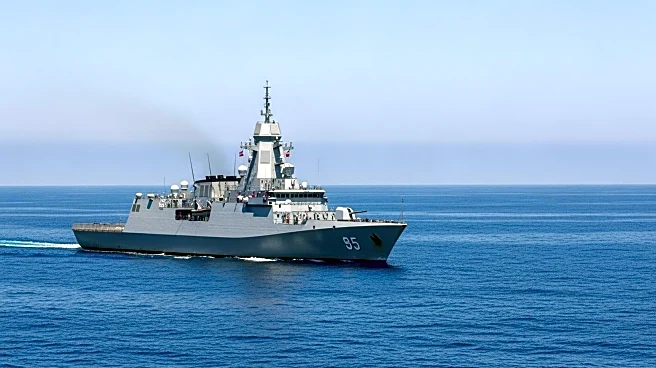What's Happening?
A Russian naval flotilla has arrived in the South China Sea, a region marked by overlapping territorial claims involving several countries, including China. The deployment includes the frigate Marshal Shaposhnikov, the corvette Gremyashchy, and the large
sea tanker Boris Butoma, which have docked at the port of Da Nang in Vietnam for a friendly visit. This move comes as the United States and China conduct competing military drills in Southeast Asia, highlighting the strategic importance of the region. The Russian presence may indicate support for China in its territorial disputes with the Philippines, a U.S. treaty ally.
Why It's Important?
The arrival of the Russian navy in the South China Sea underscores the geopolitical complexities in Southeast Asia, where the U.S. and China vie for influence. Russia's involvement could bolster China's position in its territorial disputes, potentially affecting U.S. interests and alliances in the region. The deployment also reflects Russia's ongoing efforts to strengthen diplomatic and military ties with Southeast Asian countries, despite facing Western sanctions over its actions in Ukraine. This development could shift regional dynamics and influence future diplomatic and military engagements.
What's Next?
The Russian naval task group is expected to continue its Asia-Pacific deployment after the port call in Vietnam, potentially engaging in further diplomatic and military activities in the region. Meetings between Russian and Vietnamese naval representatives are scheduled, which may lead to increased cooperation in maritime infrastructure and security. The ongoing presence of Russian forces in the South China Sea could prompt responses from other regional stakeholders, including the U.S. and its allies, as they navigate the evolving geopolitical landscape.
Beyond the Headlines
Russia's deployment in the South China Sea may have long-term implications for regional security and diplomatic relations. The move could strengthen Russia's image as a strategic partner in Southeast Asia, contrasting with Western perceptions. Additionally, the deepening ties between Russia and Vietnam, particularly in shipbuilding and maritime infrastructure, could influence future economic and military collaborations, potentially altering the balance of power in the region.
















